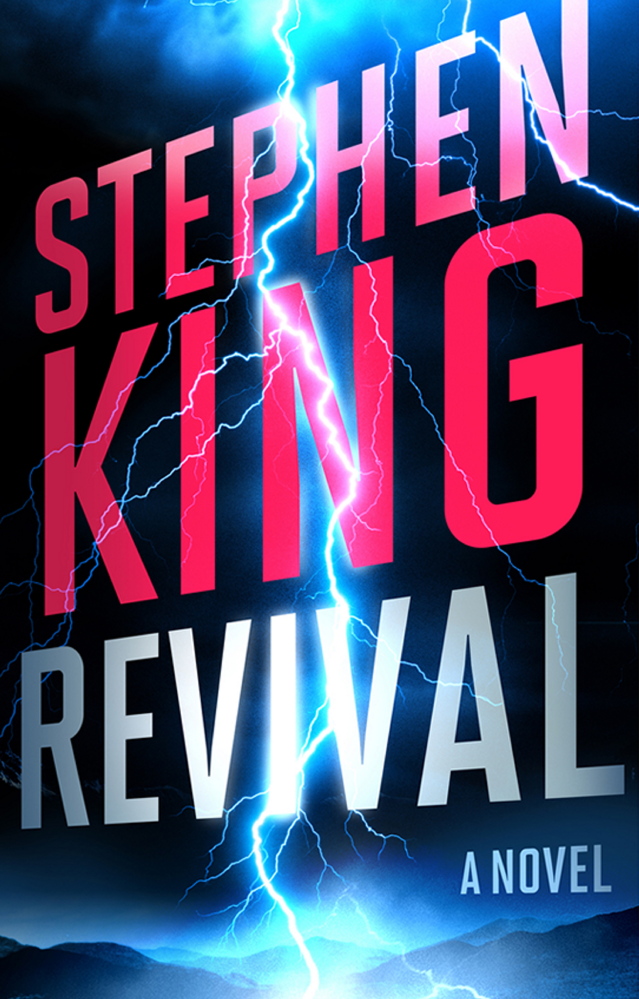After a recent detour, Stephen King returns to the supernatural and to a Maine setting in his new novel, ‘Revival.’
It’s only been five months since Stephen King’s last novel, “Mr. Mercedes,” hardly enough time for even his most ardent fans to feel the first pangs of withdrawal. That book, however, saw him take a detour into the realm of the hard-boiled thriller. Now he’s squarely back in horror country with “Revival,” a tale of supernatural obsession that spans more than 50 years.
King is at his best when he sets his books in Maine, and “Revival” has plenty of Vacationland local color. It’s set partially in Harlow, one of the calmer King locations, especially when compared to fictional trouble spots like Castle Rock, Derry or Jerusalem’s Lot.
When 6-year-old Jamie Morton first encounters the Rev. Charles Jacobs, he takes an instant liking to the Methodist minister. So do the other congregants, who are all charmed by the pastor’s pretty wife and their cute toddler.
In his spare time, Jacobs enjoys tinkering with electrical gadgets in his basement. When Jamie’s older brother Conrad loses his voice after being hit in the throat with a ski pole, Jacobs uses his “nerve stimulator” on the boy, allowing him to speak again.
But when an unforeseeable tragedy strikes, Jacobs loses his faith and destroys his ministerial career by delivering what Jamie comes to think of as The Terrible Sermon.
On the Sunday before Thanksgiving, Jacobs rails at his congregation from the pulpit, concluding, “Religion is the theological equivalent of a quick-buck insurance scam, where you pay in your premium year after year, and then, when you need the benefits you paid for – pardon the pun – so religiously, you discover the company that took your money does not, in fact, exist.”
Over the next four decades, Jamie’s path will intersect with the former pastor’s, sometimes at Jamie’s instigation, sometimes at Jacobs’, sometimes seemingly through pure chance.
Jamie comes to see Jacobs as his nemesis, but he understands that he owes the ex-reverend a debt for curing his heroin addiction and the leg injury he used as the justification for shooting up.
Other people from across the country also claim to have been miraculously healed by Jacobs, in circumstances that can’t be explained away by traditional medicine.
But for all the positive results, Jamie unearths other cases with sinister side effects. He himself suffers from blackouts and obsessive thoughts, but they seem a small price to pay for having his health and sobriety back.
Through the many years, Jacobs remains fixated on electricity and the awesome power of lightning. He believes that there is a secret kind of power that runs the universe, and he builds machines through which he hopes to harness it.
Jacobs insists that Jamie assist him in his quest for the ultimate energy source.
“Revival” is an old-fashioned horror novel, slow to build its sense of impending doom but delivering a riveting climactic sequence.
Its roots extend at least as far back as Mary Shelley’s “Frankenstein,” whose monster was animated in the film version through the power of electricity.
The epigraph for the novel comes from H.P. Lovecraft: “That is not dead which can eternal lie / And with strange aeons, even death may die.” King doesn’t often dip into the “Cthulhu Mythos” as a source of inspiration, preferring terrors more down-to-earth than Lovecraft’s malevolent cosmic entities. “Revival” doesn’t owe a direct debt to anything dreamed up by the author of “The Colour Out of Space” or “The Shadow Over Innsmouth,” but it does conjure up that kind of existential dread that results from the contemplation of a dark, uncaring universe.
As the narrative nears its climax, readers sense that terrible things lie ahead not only for Jamie, but for every soul on the planet.
The big question of “Revival” is why, if he expects such disastrous results, Jamie Morton feels honor-bound to keep the agreement he ultimately makes with Jacobs.
The answer may lie in what made Jamie a junkie or what even makes him human. Sometimes you can’t just walk away from something you know is bad for you.
As a horror novel, “Revival” doesn’t match the intensity of “Doctor Sleep,” last year’s sequel to “The Shining.”
It’s a little too straightforward in its plotting and too one-note in some of its characterization. But it delivers brutal shocks to the system and proves that King still has plenty of juice left in his literary battery.
Northern New England native Michael Berry is a writer and reviewer whose articles have appeared in various national and local publications. He has been the science fiction/fantasy columnist for the San Francisco Chronicle for many years. He can be contacted at:
mikeberry@mindspring.com or @mlberry
Send questions/comments to the editors.




Comments are no longer available on this story